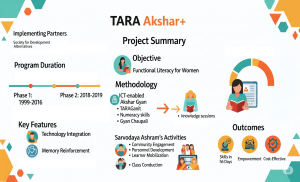The TARA Akshar+ Project, an innovative and impactful initiative, was a collaborative effort between the Society for Development Alternatives (SDA) and Sarvodaya Ashram.
This esteemed partnership was formed with the shared goal of implementing a robust functional literacy program in underserved communities. Sarvodaya Ashram served as the dedicated implementation partner, executing the project in two distinct phases: the first spanning from 1999 to 2006, and the second from 2018 to 2019.

Project Overview and Methodology
Developed by the Society for Development Alternatives under its mandate to empower communities, the TARA Akshar+ program was a cutting-edge, information and communication technology (ICT)-enabled literacy and numeracy initiative.
The project’s primary objective was to impart functional literacy to illiterate women in both rural and urban areas, equipping them with the essential skills to read, write, and perform simple arithmetic. The methodology was groundbreaking, utilizing advanced learning and memory techniques designed to accelerate the learning process significantly.
The program was structured in a multi-stage approach to ensure comprehensive and sustained learning. The core curriculum, delivered over just 56 days, was divided into two key components: Akshar Gyan and TARAGanit. This intensive, two-hour daily class was highly instructive and engaging, often incorporating entertaining elements to maintain learner motivation.
Following this initial phase, the project introduced Gyan Chaupali, a post-literacy program lasting six months, which served to supplement and reinforce the skills acquired, ensuring neo-literates could maintain and promote their newfound literacy.
Key Features and Strategic Advantages
The success of the TARA Akshar+ program was underpinned by a suite of strategic features that differentiated it from conventional literacy initiatives:
- Technology Integration: As a computer-based program, TARA Akshar+ leveraged technology to create a dynamic and standardized learning experience.
- Memory Reinforcement: The program incorporated a fool-proof memory technique, ensuring that the knowledge acquired was retained effectively and could be applied reliably.
- Innovative Pedagogy: Its teaching methodology was pioneering, offering an efficient and engaging alternative to traditional classroom models.
- Conducive Scheduling: By holding classes in beneficiaries’ own villages at convenient times, the program maximized participation and minimized logistical barriers.
- Robust Quality Control: A rigorous quality control system was built into the program’s design, guaranteeing consistent and high standards across all learning centers.
- Local Cadre of Personnel: The project relied on a strong cadre of trained local personnel, fostering community ownership and ensuring a sustainable model.
- In-built Sustenance Mechanisms: The design included mechanisms to ensure the long-term impact of the program extended beyond the initial learning period.
Impact and Transformative Outcomes
The project’s impact on neo-literates was profound and multifaceted. By providing functional literacy and numeracy skills in an exceptionally short timeframe of just 56 days, it demonstrated an unparalleled level of efficiency.
The use of memory-reinforcing techniques ensured that the skills were not only rapidly acquired but also strongly retained, making the program demonstrably more reliable than many alternatives.
This rapid acquisition of skills had a transformative effect on the women who participated. Within a matter of weeks, learners were able to read simple books, write letters, and confidently handle their shopping and banking transactions.
This empowerment positioned them to become more vocal members within their families and effective leaders in their communities. TARA Akshar+ was a cost-effective solution that saved considerable time and resources compared to other programs, proving its scalability with systems and processes in place to double capacity annually. The ultimate outcome was a holistic change in the lives of female community members in the rural extremities of Uttar Pradesh.
The Role of Sarvodaya Ashram
As the implementation partner, Sarvodaya Ashram played a monumental role in the project’s success, handling a comprehensive range of key activities essential for its execution and impact. Their involvement was crucial at every stage, from initial engagement with the community to providing ongoing support. The key activities managed by Sarvodaya Ashram included:
- Community Engagement: Conducting baseline surveys and engaging in community mobilization to identify needs and secure local buy-in.
- Personnel Development: Selecting and training local teachers to deliver the program with fidelity and expertise.
- Learner Mobilization: Actively mobilizing and enrolling learners to ensure high participation rates.
- Class Conduction and Support: Facilitating the regular conduction of classes and providing essential handholding and on-ground support to both learners and teachers.
- Regular Reporting: Ensuring timely and accurate reporting to track progress and maintain accountability.
Sarvodaya Ashram’s meticulous execution of these activities was instrumental in achieving the project’s ambitious goals, cementing its role as a crucial instrument for positive change in the region.

